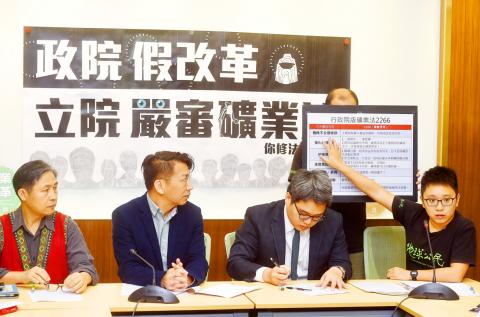Environmental groups yesterday called on members of the legislature’s Economics Committee to rework the draft amendments to the Mining Act (礦業法) to prevent mining corporations from exploiting Aboriginal property.
While many lawmakers proposed their drafts in previous legislative sessions, the Executive Yuan published its draft on Dec. 7, sparking criticism from many lawmakers and environmentalists over its content.
The Cabinet’s draft is more regressive than the one proposed in July by the Bureau of Mines, Citizen of the Earth, Taiwan consultant Tsai Chung-yueh (蔡中岳) told a news conference before the meeting, adding that Democratic Progressive Party (DPP) lawmakers are allegedly planning to rush it through.

Photo: Chien Jung-fong, Taipei Times
Regarding Article 13, the Cabinet proposed that miners applying for mining permit extensions should undergo a new environmental impact assessment conducted by the Environmental Protection Administration (EPA).
However, the draft does not require miners to stop their operations during the assessment, New Power Party Legislator Hsu Yung-ming (徐永明) said, adding that the Ministry of Economic Affairs is the agency that determines whether a mining project can be extended.
The EPA has been reduced to a subsidiary of the ministry, which would be given unduly administrative power to make decisions about mining projects, he said.
The act should not cater to the needs of Asia Cement Corp, Hsu said, urging lawmakers who have received donations from cement makers to withdraw from the review to avoid conflicts of interest.
The Cabinet proposed a new article, 43-2, that would require miners applying for a permit extension to observe the Indigenous Peoples Basic Act (原住民族基本法) by submitting documents to prove that local Aborigines have agreed to or joined their project.
However, this would mean that their approval is not necessary, Citizen of the Earth, Taiwan researcher Huang Ching-ting (黃靖庭) said.
The government only respects Aborigines when it needs them to perform in big events, but as for their rights to land and natural resources, it can find all kinds of excuses to exploit their property, Legal Aid Foundation lawyer Hsieh Meng-yu (謝孟羽) said.
Regulations regarding Aborigines’ approval and the extension of mining permits were among the most hotly debated subjects during the meeting.
As lawmakers could not reach consensus about many articles, DPP Legislator Chiu Chih-wei (邱志偉), the committee convener, said that the review is to continue tomorrow and on Thursday if necessary.

The manufacture of the remaining 28 M1A2T Abrams tanks Taiwan purchased from the US has recently been completed, and they are expected to be delivered within the next one to two months, a source said yesterday. The Ministry of National Defense is arranging cargo ships to transport the tanks to Taiwan as soon as possible, said the source, who is familiar with the matter. The estimated arrival time ranges from late this month to early next month, the source said. The 28 Abrams tanks make up the third and final batch of a total of 108 tanks, valued at about NT$40.5 billion

A group from the Taiwanese Designers in Australia association yesterday represented Taiwan at the Midsumma Pride March in Melbourne. The march, held in the St. Kilda suburb, is the city’s largest LGBTQIA+ parade and the flagship event of the annual Midsumma Festival. It attracted more than 45,000 spectators who supported the 400 groups and 10,000 marchers that participated this year, the association said. Taiwanese Designers said they organized a team to march for Taiwan this year, joining politicians, government agencies, professionals and community organizations in showing support for LGBTQIA+ people and diverse communities. As the first country in Asia to legalize same-sex

MOTIVES QUESTIONED The PLA considers Xi’s policies toward Taiwan to be driven by personal considerations rather than military assessment, the Epoch Times reports Chinese President Xi Jinping’s (習近平) latest purge of the Chinese People’s Liberation Army (PLA) leadership might have been prompted by the military’s opposition to plans of invading Taiwan, the Epoch Times said. The Chinese military opposes waging war against Taiwan by a large consensus, putting it at odds with Xi’s vision, the Falun Gong-affiliated daily said in a report on Thursday, citing anonymous sources with insight into the PLA’s inner workings. The opposition is not the opinion of a few generals, but a widely shared view among the PLA cadre, the Epoch Times cited them as saying. “Chinese forces know full well that

Travel agencies in Taiwan are working to secure alternative flights for travelers bound for New Zealand for the Lunar New Year holiday, as Air New Zealand workers are set to strike next week. The airline said that it has confirmed that the planned industrial action by its international wide-body cabin crew would go ahead on Thursday and Friday next week. While the Auckland-based carrier pledged to take reasonable measures to mitigate the impact of the workers’ strike, an Air New Zealand flight arriving at Taipei from Auckland on Thursday and another flight departing from Taipei for Auckland on Saturday would have to